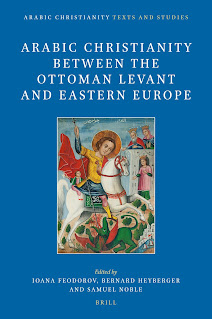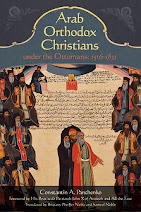Arabic original here.
Right Belief
In our Church, there are a number of commemorations of the Holy Fathers, and this Sunday is one of them. The Fathers are those bishops who gathered at the seven Ecumenical Councils. The heretics who left the Church and broke off from her greatly fought against her, and so there had to be a response to them, from the First Ecumenical Council, which produced the Creed that we recite at the divine liturgy "I believe in one God, the Father almighty..." to the Seventh Ecumenical Council, which taught us to venerate icons.
In this way dogma was accepted and shaped into words. It is the orthodox dogma to which we hold fast. It makes the Gospel clear for us and sets the bounds of faith, insofar as one who adds to this faith departs from it and one who removes something from this faith also departs from it.
The question is why and how heresies spring up within the Church. It is because the human intellect is free and people sometimes read without understanding. There are those who read and understand, but many people falsify what they read because of their sins or for no particular reason they do not understand. This is a tragedy that occurs in the Church. Heresies will inevitably appear and some will inevitably break off from the Church because of their lack of understanding. In the Gospel of Luke we read "Woe to the person by whose hand come scandals. It would be better for a millstone to be tied around his neck and for him to be cast into the sea than for him to cause one of these little ones to stumble" (Luke 17:1-2). The Holy Fathers, the bishops who gathered between the fourth and the eighth centuries and set down for us these creeds knew that the greatest sin that a person can commit is to split the Church. Anyone who brings forth a dogma that is not recognized by orthodox believers breaks the body of Christ.
There are those who say, "This one Gospel, let us come to an understanding over it." But reality is not like this. The reality is that Saint Athanasius, bishop of Alexandria in the fourth century, had this gospel and understood it as everyone understood it, that Christ is God, eternal and uncreated. In the very same city there was another man called Arius, a priest in the very same Church, who took the Gospel and understood from it that Christ is not God, but rather created. The Gospel is the foundation, but people build on this foundation. Some of them build a well-established house and some build a shaky house because they inject their own thoughts and thoughts from their surroundings or from their passions.
But who speaks the truth? How do we know it? Herein comes consultation. The ecumenical council was a global consultation among the bishops of the Christian world. The bishops were placed by God, as we hear in today's Epistle, to guard dogma and to keep watch over the flock that the Wolf scatters. The work of the bishops is to study and discuss theology and to give the people sound theology so that correct behavior comes from correct faith. A person cannot be saved without faith. The Church's work is not only to build churches of stone. Her work is to build churches where true faith is taught. If we are upright in faith, then we are the richest and most glorious people. We stand in order to preserve the Gospel, to live the Gospel, and to enjoy the beauty of Christ.
As we commemorate the Holy Fathers, we must renew our allegiance to Orthodox dogma and our allegiance to the Church as she is and wherever she may be, in the parish of which we are a part, so that God may remain among us and so that our faith may shine with His love forever.
Right Belief
In our Church, there are a number of commemorations of the Holy Fathers, and this Sunday is one of them. The Fathers are those bishops who gathered at the seven Ecumenical Councils. The heretics who left the Church and broke off from her greatly fought against her, and so there had to be a response to them, from the First Ecumenical Council, which produced the Creed that we recite at the divine liturgy "I believe in one God, the Father almighty..." to the Seventh Ecumenical Council, which taught us to venerate icons.
In this way dogma was accepted and shaped into words. It is the orthodox dogma to which we hold fast. It makes the Gospel clear for us and sets the bounds of faith, insofar as one who adds to this faith departs from it and one who removes something from this faith also departs from it.
The question is why and how heresies spring up within the Church. It is because the human intellect is free and people sometimes read without understanding. There are those who read and understand, but many people falsify what they read because of their sins or for no particular reason they do not understand. This is a tragedy that occurs in the Church. Heresies will inevitably appear and some will inevitably break off from the Church because of their lack of understanding. In the Gospel of Luke we read "Woe to the person by whose hand come scandals. It would be better for a millstone to be tied around his neck and for him to be cast into the sea than for him to cause one of these little ones to stumble" (Luke 17:1-2). The Holy Fathers, the bishops who gathered between the fourth and the eighth centuries and set down for us these creeds knew that the greatest sin that a person can commit is to split the Church. Anyone who brings forth a dogma that is not recognized by orthodox believers breaks the body of Christ.
There are those who say, "This one Gospel, let us come to an understanding over it." But reality is not like this. The reality is that Saint Athanasius, bishop of Alexandria in the fourth century, had this gospel and understood it as everyone understood it, that Christ is God, eternal and uncreated. In the very same city there was another man called Arius, a priest in the very same Church, who took the Gospel and understood from it that Christ is not God, but rather created. The Gospel is the foundation, but people build on this foundation. Some of them build a well-established house and some build a shaky house because they inject their own thoughts and thoughts from their surroundings or from their passions.
But who speaks the truth? How do we know it? Herein comes consultation. The ecumenical council was a global consultation among the bishops of the Christian world. The bishops were placed by God, as we hear in today's Epistle, to guard dogma and to keep watch over the flock that the Wolf scatters. The work of the bishops is to study and discuss theology and to give the people sound theology so that correct behavior comes from correct faith. A person cannot be saved without faith. The Church's work is not only to build churches of stone. Her work is to build churches where true faith is taught. If we are upright in faith, then we are the richest and most glorious people. We stand in order to preserve the Gospel, to live the Gospel, and to enjoy the beauty of Christ.
As we commemorate the Holy Fathers, we must renew our allegiance to Orthodox dogma and our allegiance to the Church as she is and wherever she may be, in the parish of which we are a part, so that God may remain among us and so that our faith may shine with His love forever.








No comments:
Post a Comment